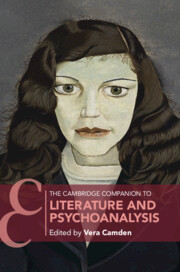Book contents
- The Cambridge Companion to Literature and Psychoanalysis
- The Cambridge Companion to Literature and Psychoanalysis
- Copyright page
- Contents
- Figures
- Abbreviations
- Contributors
- Acknowledgments
- Chronology
- Introduction Reading to Recover
- Part I In History
- Part II In Society
- Part III In Sight
- Part IV In Theory
- Further Reading
- Index
Introduction - Reading to Recover
Literature and Psychoanalysis
Published online by Cambridge University Press: 16 December 2021
- The Cambridge Companion to Literature and Psychoanalysis
- The Cambridge Companion to Literature and Psychoanalysis
- Copyright page
- Contents
- Figures
- Abbreviations
- Contributors
- Acknowledgments
- Chronology
- Introduction Reading to Recover
- Part I In History
- Part II In Society
- Part III In Sight
- Part IV In Theory
- Further Reading
- Index
Summary
The Introduction to The Cambridge Companion to Literature and Psychoanalysis historicizes the link between literature and psychoanalysis, addressing current trends in the field, while predicting the impact the volume can have on its future directions and discoveries. Born within the cultural matrix of nineteenth-century Vienna, the theory of psychoanalysis found its way into the intellectual mainstream in the first part of the twentieth-century. In the second half of the twentieth-century, it went on to take hold in the American and European academy, first in medicine and then in the humanities. Now in the early decades of the twenty-first century, the academic influence of psychoanalysis has waned, due to sweeping cultural and critical forces. This falling off is important to understand as the original bond between literature and psychoanalysis is revived to offer new directions for our century. The Introduction to The Cambridge Companion to Literature and Psychoanalysis will place literature at the generative core of this ambition, for it remains a repository of knowledge derived from creativity that makes us human. The consilience between literature and psychoanalysis predicated Freud’s discoveries of the unconscious; that same family bond can foster revelatory and revolutionary truths for the next generation.
- Type
- Chapter
- Information
- Publisher: Cambridge University PressPrint publication year: 2021

